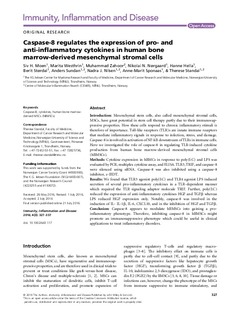| dc.contributor.author | Moen, Siv Helen | |
| dc.contributor.author | Westhrin, Marita | |
| dc.contributor.author | Zahoor, Muhammad | |
| dc.contributor.author | Nikolai N., Nørgaard | |
| dc.contributor.author | Hella, Hanne | |
| dc.contributor.author | Størdal, Berit Fladvad | |
| dc.contributor.author | Sundan, Anders | |
| dc.contributor.author | Nilsen, Nadra J. | |
| dc.contributor.author | Sponaas, Anne-Marit | |
| dc.contributor.author | Standal, Therese | |
| dc.date.accessioned | 2016-08-24T12:49:44Z | |
| dc.date.accessioned | 2016-09-05T13:21:02Z | |
| dc.date.available | 2016-08-24T12:49:44Z | |
| dc.date.available | 2016-09-05T13:21:02Z | |
| dc.date.issued | 2016 | |
| dc.identifier.citation | Immunity,Inflammation and Disease 2016 | nb_NO |
| dc.identifier.issn | 2050-4527 | |
| dc.identifier.uri | http://hdl.handle.net/11250/2404359 | |
| dc.description.abstract | Introduction:
Mesenchymal stem cells, also called mesenchymal stromal cells, MSCs, have great potential in stem cell therapy partly due to their immunosuppressive properties. How these cells respond to chronic inflammatory stimuli is therefore of importance. Toll-like receptors (TLR)s are innate immune receptors that mediate inflammatory signals in response to infection, stress, and damage. Caspase-8 is involved in activation of NF-kB downstream of TLRs in immune cells. Here we investigated the role of caspase-8 in regulating TLR-induced cytokine production from human bone marrow-derived mesenchymal stromal cells (hBMSCs).
Methods:
Cytokine expression in hBMCs in response to poly(I:C) and LPS was evaluated by PCR, multiplex cytokine assay, and ELISA. TLR3, TRIF, and caspase-8 were silenced using siRNA. Caspase-8 was also inhibited using a caspase-8 inhibitor, z-IEDT.
Results:
We found that TLR3 agonist poly(I:C) and TLR4 agonist LPS induced secretion of several pro-inflammatory cytokines in a TLR-dependent manner which required the TLR signaling adaptor molecule TRIF. Further, poly(I:C) reduced the expression of anti-inflammatory cytokines HGF and TGFβ whereas LPS reduced HGF expression only. Notably, caspase-8 was involved in the induction of IL- IL-1β, IL-6, CXCL10, and in the inhibition of HGF and TGFβ.
Conclusion:
Caspase-8 appears to modulate hBMSCs into gaining a pro-inflammatory phenotype. Therefore, inhibiting caspase-8 in hBMSCs might promote an immunosuppressive phenotype which could be useful in clinical applications to treat inflammatory disorders. | nb_NO |
| dc.language.iso | eng | nb_NO |
| dc.publisher | Wiley Open Access | nb_NO |
| dc.rights | Navngivelse 3.0 Norge | * |
| dc.rights.uri | http://creativecommons.org/licenses/by/3.0/no/ | * |
| dc.title | Caspase-8 regulates the expression of pro- and anti-inflammatory cytokines in human bone marrow-derived mesenchymal stromal cells | nb_NO |
| dc.type | Journal article | nb_NO |
| dc.type | Peer reviewed | nb_NO |
| dc.date.updated | 2016-08-24T12:49:44Z | |
| dc.source.journal | Immunity,Inflammation and Disease | nb_NO |
| dc.identifier.doi | 10.1002/iid3.117 | |
| dc.identifier.cristin | 1375036 | |
| dc.description.localcode | © 2016 The Authors. Immunity, Inflammation and Disease Published by John Wiley & Sons Ltd. This is an open access article under the terms of the Creative Commons Attribution License, which permits use, distribution and reproduction in any medium, provided the original work is properly cited. | nb_NO |

